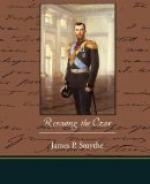The second day of my occupation,—it was about eleven when the sentinels were changed and the night was warm and bluish, the demonstration, perhaps in my honor, was exceptionally noisy and obscene.
“How do you like it?” asked Pashinsky gloriously, looking at me and showing, instead of teeth, a burned-out cemetery in his mouth. “Don’t they get enough? They just went to bed—and here is the music.”
“Fine!” I answered. “Why don’t we shoot? It makes more noise and frightens much more.”
“We used to do so,” he said with regret, “but all these burjoois, and the popes, and the whole carrion of Tobolsk did not like it. So we have decided for the moment not to. Nobody can forbid singing. We are free. The air belongs to the Soviet Government.”
Then he continued:
“You should have seen those little ones”—he winked his eyes—“they got scared to death the first time we sang the “Parson’s Daughter” right near their windows! And I’ll tell you....” he whispered something in my ear.
I decided to start with him when it comes to rid the world of some of these Reds.
“Good!” I said with extreme pleasure and tapping him on the shoulder, “Where are their rooms?”
“Right where the white curtain hangs ... you see ... one ... two ... three ... fourth window on the second floor. They all are there in one room, they are never alone lately. They used to be on the first floor. That—was a holiday for us boys. Everything seen,—and we would....”
The smile on his face stretched from ear to ear.
“But,” he continued,—“again the popes intervened. I hope they’ll croak soon. And Kobylinsky consented. He is with us, of course,—but we must get rid of him.”
“Well, you boys have good times here,” (I said dreamily) “I am glad I came. It’s great! All these people had enough of our blood. Now—the people rule themselves! Great life!”
“You bet! Stay with us longer and you’ll see better things....”
43
Next day,—it was about four,—Pashinsky, who sticks near me thinking I am his best friend and admirer, punched me with his elbow and said:
“Look, look. Who is coming.”
The Emperor, stooping and walking with tottering steps, was passing from the garden into the house. Dr. Botkin was with him. The Emperor’s hands were clasped behind him, his eyes were staring downwards. An old, soiled soldier’s blouse of khaki flannel was hanging on his spare, bowed, bony body. He was walking slowly, evidently trying to appear indifferent and calm.
I had not seen him for a year and a half or even more. There was more gray in his whiskers,—and to me, at this moment he never seemed to so strikingly resemble his more fortunate English cousin.
They passed very near us. Pashinsky loudly yawned and stretched right in the Emperor’s face, who looked at him blankly; but under a dignified and elaborate calm—I detected a spark of wounded majesty. Then he looked at me,—evidently seeing in me nothing but a new jailer,—sighed, and turned his suffering face away. Dr. Botkin looked at me, too; he recognized me with a start.




